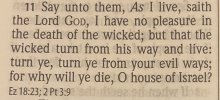R C Sproul is a "PRETERIST" so pretty much anything he says must be filtered through that false teaching.In a matter of speaking, yes. However, I was addressing the sermons from MacArthur, not so much the topic of Calvinism, nor extreme Calvinism. You're right. That will not be resolved in this timeline of existence.
MM
Thoughts?????Please keep this friendly and scripturally conceptual in nature rather than to argue against the opinions of others. If you disagree with another, then simply ask questions. If you still disagree, then simply share your thoughts in a non-combative manner. I'm bringing this up because I value what the Lord may have given to others on this troubling topic.
As some of you likely know, TULIP is the acronym for concepts held to by the hardline Calvinists, of which I was of the understanding is the side upon which John MacArthur and RC Sproul always taught from.
This morning, I ran across a short from MacArthur talking about how tragic the losses are of the cultists and atheists alike, and their being lost to Hell.
If my understanding is correct about those two men mentioned above, then that sermon makes no sense, and the reasons being that TULIP adherents:
1) Believe that God intentionally predetermines who goes to Heaven and who goes to Hell
2) They do not concern themselves about any other basis by which such a decision is made, and therefore have nothing at which to point for deeper understanding, other than #3
3) It's perfectly just for God to intentionally predetermine who goes to Hell because of His Sovereignty
I could list more, but will let this suffice.
Now, if all those people going to Hell is indeed a tragedy, then it that not an accusation against God Himself...if He is the One who predetermines for everyone as to who goes where, irrespective of personal choice? How can it be said that, given TULIP theology, His perfect justice is therefore tragic in light of all those people who are Hell-bound?
How is ANY decision the Lord makes a matter of tragedy, whether in the framework of TULIP or any other, given that He is perfectly just? If the Lord predetermines who goes to Hell irrespective of the choice the individual might have otherwise made, then, to my thinking, He would not have stated His desire that ALL men be saved. He would then have within Himself an internal contradiction, which I do not believe exists in His nature at all.
Some have then carried this further by claiming that freedom then forced God to have to wait on individuals to make up their minds at some point in their lives.
This creates for itself yet another dichotomy, and is therefore self-defeating. None of the adherents to TULIP theology has ever been able to answer one prime question in it all...how does the Lord giving to mankind the freedom to choose violate His Sovereignty? If the Lord chose to wait upon each individual, then what difference would that make to us? Who made mankind arbiters over what's right with God, and what is not, irrespective of His own Sovereign choice for our salvation.
Where it's true that we cannot save ourselves on the basis of any freedom for a decision, it it is still, and will always remain, only Christ Jesus who saves anyone. It's also true that nobody comes to Christ except that they are drawn by the Father. Again, the TULIP adherents have utterly failed to explain any decision mechanism for the Father's drawing of any man. Perhaps that criteria will remain a mystery throughout all eternity, but it seems reasonable that a man's recognition of his sinful condition, and therefore His need for what he desires, which is to be saved, and given that the Lord looks upon the heart, perhaps that's the mechanism in a very simplistic basis for explanation.
If the Gospel is powerful, then it has the ability to reach and strike the chord of resonance in all men, with most rejecting that resonance, and some responding to it.
Thoughts?
MM
I do not think that this thread will be here for long. TOOOO BAD! It is a deep subject that needs to be taught and understood, BUT human nature to be right just will not allow it to be civil.
Now, before the axe falls, allow me to say to you all that there are 5 levels of Calvinism.......
1. Hyper-Calvinism:
Beliefs: God is the author of sin and man has no responsibility before God. The Gospel should only preached to the elect.
2. Ultra High Calvinism:
Beliefs: That the elect are in some sense eternally justified.
3. High Calvinism:
Beliefs: That God in no sense desires to save the reprobate, Most deny the Well-Meant Offer. Supralapsarian viewing God’s decrees. All hold to limited atonement.
4. Moderate Calvinism:
Beliefs: That God does in some sense desires to save the reprobate, Infralapsarian in viewing God’s decrees. Affirms Common Grace.
5. Low Calvinism:
Beliefs: That Christ died for all in a legal sense, so one can speak of Christ dying for the non-elect.
Now if you will sit and think it through, ALL of us are in one of those classes. From what I have read, John Macarther and John Piper are in the #4, maybe 4.5. FYI..........I would be about a 4.5 or 5.
Now, personally, I do not believe that Calvinism or Predestination is all that I am as a Christian.
I believe in the total sovereignty of God over all things (including salvation) and it certainly drives all that we do according to Psalm 135.6.
Now when I was active preaching, election wasn’t the topic of every sermon, actually very few in fact.
I have people who don’t hold my views, and it does not affect our fellowship and that is the way it should be.
When Bible texts address the issue, I deal with them one at a time.
I have never preached or taught part of a verse to avoid the “election” part.
That is my thoughts on this!



 I have some additional points to make about the atonement, as well Biblical election and predestination, but I'll have to do so when I return.
I have some additional points to make about the atonement, as well Biblical election and predestination, but I'll have to do so when I return. (gotta go/hope to return tonight .. Dv)
(gotta go/hope to return tonight .. Dv)
 .
.